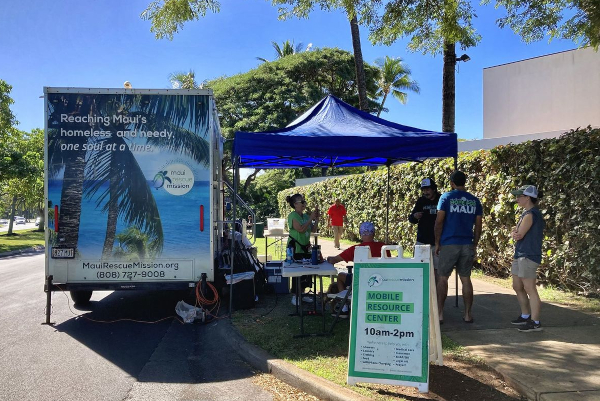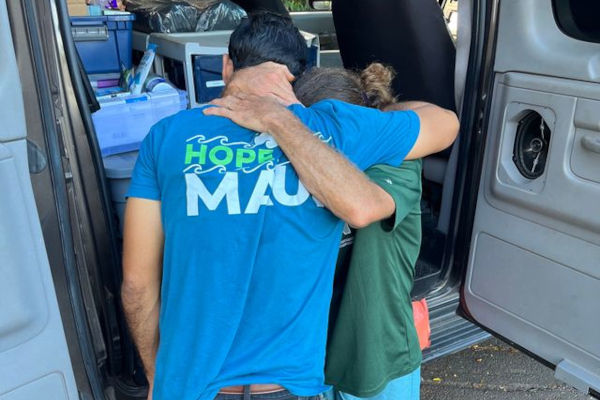Meeting Maui Residents Where They Are
Using mobile hygiene units as an entry point, Maui Rescue Mission connects with unhoused people on their terms.

When Maui resident “Charles” lost work as a contractor nearly a decade ago, he assumed he’d easily get back on his feet. (We are using a pseudonym to protect his privacy.) As a skilled carpenter and Vietnam veteran, he understood self-reliance and resilience better than most. However, when Charles was still unable to find work after several months, he began living in his car. It was a devastating blow for Charles, who prided himself on his strong work ethic and knack for making the best out of difficult times.
Charles became frustrated about his situation and was wary of those who offered assistance. Volunteers from one organization, Maui Rescue Mission, spent nearly six months visiting Charles. Twice a week, they would invite him to their mobile hygiene center five minutes down the road for a shower, to get his clothes washed, and for something to eat. The turning point for him came after his car and cell phone were both stolen, within days of each other. Charles went to the pop-up resource center, where volunteers, including Maui Rescue Mission executive director Scott Hansen, would listen to him.
“People sometimes feel that, if something is being offered for free, there’s some kind of catch,” Hansen says.
Hansen and his team were ultimately able to connect Charles with representatives from Veterans Affairs, who were able to get him into housing. And, although unfortunately Charles lost his new housing due to the Lahaina fire in August 2023, he was able to receive assistance from the Maui Rescue Mission and the VA, which helped Charles find new housing on O‘ahu.
Since 2015, Maui Rescue Mission has provided hygiene assistance and critical resources for Maui’s homeless community. Instead of operating a brick-and-mortar facility, which might be difficult for houseless individuals to reach, this nonprofit travels from Kīhei to Kahului and beyond. Their mobile trailer is equipped with a private shower stall and a washer and dryer.
This flexible, meet-the-people-where-they’re-at approach put them in a perfect position to offer aid in the wake of the Maui wildfires.
“When the fires hit in August, our mobility allowed us to quickly jump into action,” says Hansen. “Our trailer was able to provide showers for those living in upcountry Maui, as well as people in Lahaina whose homes didn’t burn down but were without water. We also helped folks apply for FEMA assistance and receive relief benefits they were eligible for.”

This March, Maui Rescue Mission was able to secure a second, larger mobile hygiene trailer. With the financial support of a grant from the Maui Strong Fund of the Hawaiʻi Community Foundation, they have been able to hire additional staff with the goal of having two fully staffed trailers going out to communities across Maui multiple times a day.
Since the wildfires, Maui Rescue Mission has expanded their outreach program to operate four hours a day, five days a week. Hansen estimates they serve around 20 people each day, or more than 300 people a month.
And the nonprofit’s services go beyond just a hot shower and clean laundry. Hansen’s team can assist people with securing Social Security income, Supplemental Nutrition Assistance Program (SNAP) benefits, access to medical and psychiatric care, and transportation to Maui’s Aloha House for detox and sobriety, among other services.
“The showers and laundry are something that people need regularly, so they keep coming back. This allows us to build relationships and then connect houseless individuals with other resources,” Hansen says. “They need a friend first so they can let their guard down.”
The organization is also planning for longer-term needs. Says Hansen, “when we started in 2015, Maui was already in a housing crisis. Then there was COVID-19, then the wildfires, where around 7,000 people lost their homes,” says Hansen. “It feels like we’re watching the waters recede because there’s a tsunami coming in. How many displaced families are going to end up homeless? And how can we, as a community, best provide help?”
Read more Stories of Impact